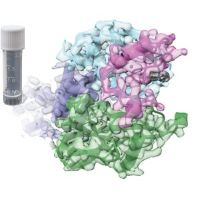Specification
| Uniprot ID | P11818 |
| Gene Names | L5 |
| Alternative Names | (SPIKE)(Protein IV) |
| Organism | Human adenovirus C serotype 5 (HAdV-5) (Human adenovirus 5) |
| Expression Host | E.coli |
| Tag Info | N-terminal 10xHis-tagged and C-terminal Myc-tagged |
| Molecular Weight | 48.4 kDa |
| Expression Region | Partial(1-392aa ) |
| Expression Region | N-terminal 10xHis-tagged and C-terminal Myc-tagged(Partial ) |
| Purity | Greater than 85% as determined by SDS-PAGE. |
| Endotoxin | Not test. |
| Form | Liquid or Lyophilized powder |
| Buffer | The default storage buffer is Tris/PBS-based buffer, 5%-50% glycerol if the delivery form is liquid. The lyophilization buffer is Tris/PBS-based buffer, 6% Trehalose, pH 8.0 if the delivery form is lyophilized powder. Please contact us if you have any special requirment. |
| Reconstitution | Please reconstitute protein in deionized sterile water and we recommend that briefly centrifuge thevial prior to opening the vial .We recommend aliquot for long-term storage at -20℃/-80℃. |
| Storage | Generally, the shelf life of liquid form is 6 months at -20℃/-80℃. The shelf life of lyophilized form is 12 months at -20℃/-80℃. The shelf life is related to many factors, storage state, buffer ingredients, storage temperature and the stability of the protein itself. |
| Protein Sequence | MKRARPSEDTFNPVYPYDTETGPPTVPFLTPPFVSPNGFQESPPGVLSLRLSEPLVTSNGMLALKMGNGLSLDEAGNLTSQNVTTVSPPLKKTKSNINLEISAPLTVTSEALTVAAAAPLMVAGNTLTMQSQAPLTVHDSKLSIATQGPLTVSEGKLALQTSGPLTTTDSSTLTITASPPLTTATGSLGIDLKEPIYTQNGKLGLKYGAPLHVTDDLNTLTVATGPGVTINNTSLQTKVTGALGFDSQGNMQLNVAGGLRIDSQNRRLILDVSYPFDAQNQLNLRLGQGPLFINSAHNLDINYNKGLYLFTASNNSKKLEVNLSTAKGLMFDATAIAINAGDGLEFGSPNAPNTNPLKTKIGHGLEFDSNKAMVPKLGTGLSFDSTGAITVG |
Background
| Research Areas | Others |
| Relevance | Forms spikes that protrude from each vertex of the icosahedral capsid. Interacts with host coxsackievirus and adenovirus receptor CXADR located at the cell tight junctions to provide virion initial attachment to target cell. The fiber protein binds to CXADR with a higher affinity than CXADR binds to itself, thereby blocking the cell-cell adhesion function of CXADR dimers and leading to local disruption of the tight junction. Fiber protein present on neo-synthesized particles may thus disrupt the junctional integrity in order to facilitate further neighboring cells infection. Fiber proteins are shed during virus entry, when virus is still at the cell surface. Fiber shedding is dependent on viral CXADR drifting motion and subsequent binding to immobile integrins. Heparan sulfate might also play a role in virus binding. |
QC Data
| Note | Please contact us for QC Data |
| Product Image (Reference Only) |  |

